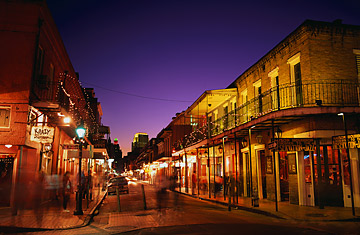
French Quarter, New Orleans
Inside Harrah's Casino, one of New Orleans' main tourist attractions, men and women are pounding away at slot machines, puffing on cigarettes and freely ordering cocktails, seemingly oblivious to the economic crisis sweeping much of the country. Maybe it's all an escape. "Oh, I don't spend that much," says Linda Buggee, 60, while walking through the casino's front doors on a recent balmy afternoon. The Palm Beach County, Fla., paralegal was eager to add to the thousand of dollars she's won in recent days. "I've been lucky," she says.
Much of America's news in recent months has been dominated by the gravest economic and financial crisis in decades. But parts of this region continue to experience an economic boom mainly driven by recovery efforts related to Hurricane Katrina. Just last week, the University of New Orleans published a report estimating that 11,700 jobs were added across metropolitan New Orleans between the third quarters of 2007 and 2008, a 2.3% increase. Much of that growth came from the construction industry, which experienced a 6.2% gain in jobs driven by massive bridge, road and school projects. That compares with a 5.9% decline nationally. (See how New Orleans has changed since Hurricane Katrina.)
What's more, the region's housing market remains relatively robust, mainly because post-Katrina demand for suitable housing remains strong and local banks haven't engaged in the sort of risky mortgages that have caused problems elsewhere in the country.
Researchers predict the region's economic recovery will last at least seven years — far beyond the expected end of the national recession sometime in 2010. Even so, there will be some downward pull from the U.S. economic slump. In 2009, for instance, they expect some 8,000 jobs to be added here, a figure that will drop to 6,500 jobs in 2010. "While the rest of the United States is in a deeper recession than anyone expected, we're certainly in a better place — we are an economy that's still looking for workers," says Janet Speyrer, associate dean for research at the University of New Orleans and an author of the report.
That optimism, however, feels as fragile and uneven as this region's recovery. Huge swaths of the city, particularly the Lower Ninth Ward, New Orleans East and the city's heart, appear as they did in the months immediately following Katrina: there are scores of vacant homes, potential magnets for crime.
The region's population stands at roughly 1.1 million, nearly 90% of its pre-Katrina level. But many of the people who've returned to the city have found neighborhoods without restaurants or supermarkets. In the case of New Orleans East, once the hub of the city's black middle class, the main library remains closed, as does the hospital.
Tammie Jones, 36, returned to the Lower Ninth Ward partly to help her 77-year-old mother repair the family home. Over three years after Katrina, their home remains unfinished. They avoid traveling to the downtown Wal-Mart for groceries, they say, mainly because it's often overcrowded and lacks basic products. "It's a horrible mess," Jones said on a recent Sunday morning, standing outside her family's church in the Lower Ninth Ward. She travels across the Mississippi River into neighboring Jefferson Parish for groceries. "We bring our tax dollars into other parishes, which is horrible. We shouldn't have to live like this," she says. "But unfortunately, our state and federal government has let us down. If we lived in another state, would we be suffering like this?"
In the months after Katrina, there was much talk of diversifying the region's economy to liberate it from its dependence on the low-paying tourism industry. That has largely failed to materialize, but there's a silver lining to that news — at least the tourism outlook is good. Stephen Perry, CEO of the New Orleans Convention and Visitors Bureau, projects that the number of people visiting the city in 2009 could be up 5% to 7% from the 7.5 million visitors in 2008. "We're feeling pretty positive coming into the year," he says. How many people, in New Orleans or elsewhere, are saying that?
